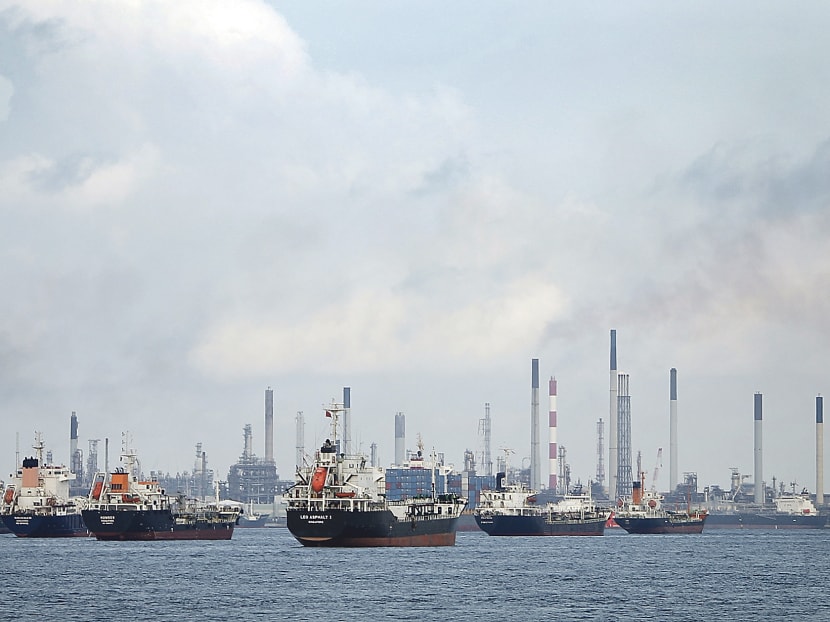Upcoming carbon tax on large emitters to be paid via credits instead of cash: Draft Bill
SINGAPORE — The carbon tax to be levied on large emitters such as power stations and refineries from 2019 will be paid for using credits bought, rather than via cash directly, under the Government’s proposed framework.
SINGAPORE — The carbon tax to be levied on large emitters such as power stations and refineries from 2019 will be paid for using credits bought, rather than via cash directly, under the Government’s proposed framework.
This system keeps options open for Singapore if and when the authorities decide to adopt other systems, such as by linking Singapore’s carbon pricing framework to a bigger jurisdiction’s.
Under the draft Carbon Pricing Bill released for public consultation on Tuesday (Oct 31), large emitters can buy carbon credits at a fixed price from the National Environment Agency (NEA) throughout a year. At the end of a year of assessment, the credits are used to pay tax levied on their total greenhouse emissions.
The new tax, at a rate of between $10 and S$20 per tonne, is expected to apply to 30 to 40 emitters, defined as those that emit 25,000 or more tonnes of greenhouse gas emissions, Finance Minister Heng Swee Keat announced in his Budget speech this year. These include power stations, refineries, semi-conductor plants and the petrochemical sector, which contributed to about 79 per cent of Singapore’s total greenhouse gas emissions, based on 2014 data.
The price of the carbon credits will be determined closer to the implementation date of the tax, said a spokesperson from the Ministry of the Environment and Water Resources (MEWR).
These entities will have to register themselves as a taxable facility by June 30, and submit their plan for monitoring emission levels to the NEA by Dec 31. Their annual report on total emissions must be submitted by June 30. The first carbon tax is expected to be paid in 2020.
The tax will have to be paid by Sept 30 every year. Those who fail to pay the carbon tax can be fined triple the amount of outstanding tax. Those who intentionally provide inaccurate information or report to dodge taxes can be fined an amount that is triple the evaded sum, on top of a fine capped at S$10,000, or jailed up to three years, or both.
The six greenhouse gases to be covered under the tax are: Carbon dioxide, methane, nitrous oxide, hydrofluorocarbons, perfluorocarbons and sulphur hexafluoride. Greenhouse gas emissions from several small emissions sources that do not form part of the main production activity for industrial facilities will be exempted from the carbon tax. These include the use of hydrofluorocarbons and perfluorocarbons in fire protection equipment and the carbon dioxide used for fire extinguishers.
This is in line with international practices, said a MEWR spokesperson.
The MEWR said it took into account international standards when designing the proposed carbon tax framework. A spokesperson said a fixed-price credit-based mechanism was favoured over direct cash payments because it allows Singapore to switch systems, if needed, as it continues to study different models of carbon pricing.
For instance, Singapore could link its carbon tax framework to a bigger jurisdiction in future and a credits system would put in place some “building blocks” for that.
Carbon pricing can come in the form of a carbon tax or an Emissions Trading Scheme, which uses market mechanisms to price carbon.
The draft Bill considers those who emitted 2,000 tonnes or more greenhouse gas in a preceding year as a reportable facility, which have to comply with similar reporting requirements in the Energy Conservation Act.
This means they have to monitor their emissions, for which they have to submit a report by June 30 every year to the NEA.
Both taxable and reportable facilities can apply to be deregistered if their greenhouse gas emissions fall below their respective thresholds for three calendar years running.
But if they can prove that there are “significant and substantial changes to its processes” that can lower its emissions “considerably” below the respective thresholds, they can apply for deregistration the very next year. The MEWR said such applications will be approved by the NEA on a case-by-case basis.
Members of the public have six weeks to give their feedback on the draft Bill, which should be submitted in softcopy to mewr_cpbill [at] mewr.gov.sg by Dec 8. This public consultation comes after an earlier one conducted by the National Climate Change Secretariat from March to May this year.







